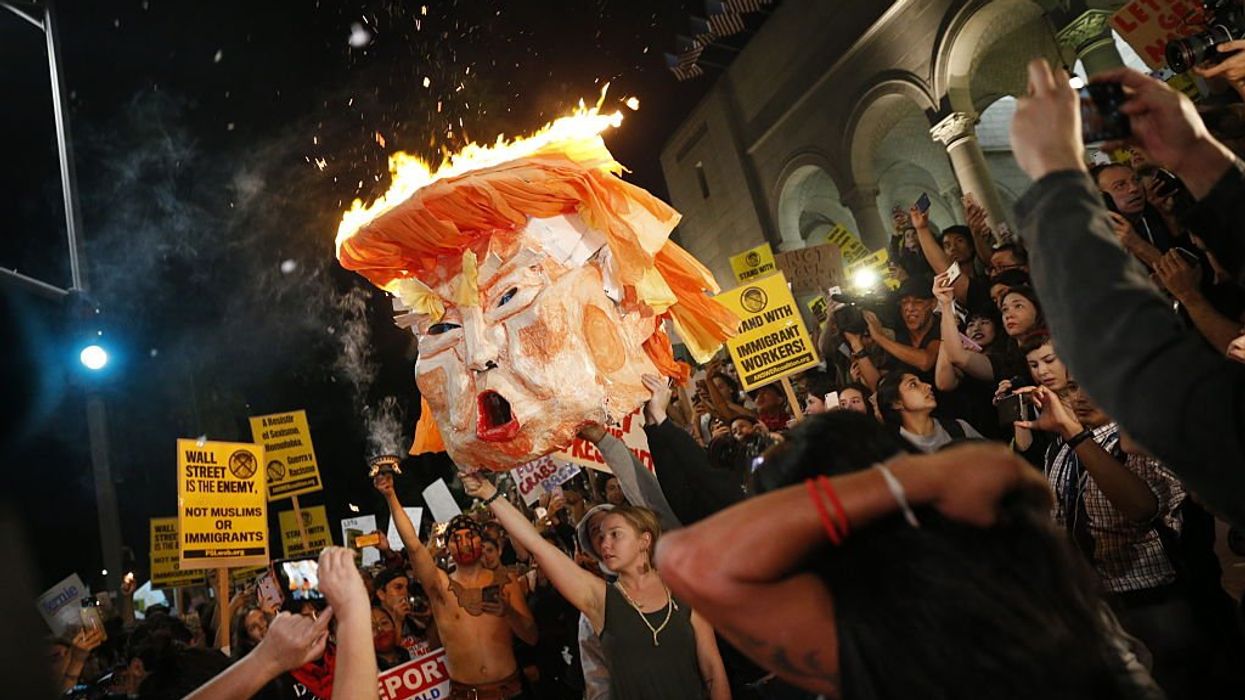
Marcus Yam/Getty Images

Heated rhetoric abounds on both sides, but nobody dehumanizes its political opponents like the left.
When Taylor Swift, America's most notable "childless cat lady," belted out "We Are Never Ever Getting Back Together," she was singing about one of her many exes.
But she might as well have been commenting on the state of American politics. The left and the right are like two people trapped in a toxic, spiteful relationship, each seething with contempt for the other. Is a national "breakup" inevitable?
This is where the left stands today: not only criticizing the other side but actually rejoicing in its suffering.
As this election makes especially clear, each side views the other as a threat to America’s future.
The left looks at the right and sees a stubborn, regressive faction clinging to an outdated vision of America — one that resists diversity, equity, and inclusion.
The right, meanwhile, sees the left as a dangerous, self-righteous force tearing down the foundations of the country in the name of progress.
While both liberals and conservatives face the temptation to villainize their opponents, these days, only one side seems to consider the other as irredeemably evil.
For all his allegedly "divisive" rhetoric, Donald Trump has repeatedly made it clear that he intends to work for all American citizens, regardless of race, color, or creed. It's a big tent, and even his political "enemies" are welcome.
Consider Trump's recent, much-misrepresented vow to protect women "whether the women like it or not."
On the left, by contrast, public figures like Sam Harris and Destiny openly scorn conservatives, branding them as “low information” or low IQ — sneering as if they’re talking about a different species altogether.
To quote another Swift song, "You Need to Calm Down."
Destiny, born Steven Kenneth Bonnell II, lives up to his pretentious name. But he’s not just pretentious; he’s downright repugnant.
Recently, he has become the left's primary attack dog, embodying the worst kind of partisan contempt. This bitter, angry provocateur frequently pops up on "Piers Morgan Uncensored" and a number of popular podcasts, where he revels in his role as a divisive figure. On social media, meanwhile, he can be found posting the vilest of opinions.
Shortly after the first assassination attempt on Donald Trump, the tiny terror took to X to ridicule Corey Comperatore, a 50-year-old volunteer fire chief who lost his life at the rally. This wasn’t just a comment on political differences; it was a callous dismissal of another human being's life, purely because he was on the "wrong" side.
This is where the left stands today: not only criticizing the other side but actually rejoicing in its suffering. Political opponents are seen as irredeemable, less than human, and unworthy of sympathy, even in death.
Figures like Destiny don’t just stir up disagreement; they stoke the flames of disgust and dehumanization that widen the divide in this country. Political leaders only make matters worse. Hillary Clinton’s infamous 2016 remark labeling Trump supporters as “deplorables” didn’t just alienate millions; it arguably cost her the election.
Fast forward eight years, and Joe Biden’s recent characterization of Trump supporters as “garbage” only served to emphasize the left's utter contempt for half of America (more on this in a minute).
Just a decade ago, the idea of Americans going to war against each other again seemed unthinkable, a relic of a brutal past. The Civil War was history — a reminder of the darkest days of division and bloodshed.
Yet today, that distant fear feels closer than ever. The idea of Americans clashing not just at the ballot box but on the battlefield no longer seems absurd. The seeds of hatred, distrust, and outright disdain have already been planted.
This brings us to the psychology of contempt. And the contempt is visceral.
To be clear, contempt is not mere anger; it runs much deeper. It’s loathing; it’s sheer hatred. According to psychologist Dr. John Gottman, contempt is the strongest predictor of lasting estrangement. It’s a malignant cancer — once it takes hold, the prognosis is almost always dire.
What can be done? In personal relationships, contempt can sometimes be eased through open communication, empathy, and a genuine effort to understand one another. But the divide between the left and right today is vastly different and far more complex. We’ve crossed a line — the Rubicon, if you will — and there’s really no turning back.
The truth is that the only event likely to unite the nation for more than a fleeting moment would be a tragedy on the scale of September 11 — a catastrophic incident that compels all Americans to confront their shared humanity amid the chaos.
In the wake of those devastating attacks, Andrew Kohut from the Pew Research Center conducted a thorough analysis of public opinion, comparing sentiments expressed before and after that fateful day. His findings revealed that the attacks not only galvanized a sense of national identity but also altered the public's perception of threats, trust in government, and overall political engagement. The United States of America was, at that moment in time, truly united.
But that was then, and this is now.
On second thought, I ask, would even a second September 11 be enough to unite the nation? That’s how fractured the country has become, and things are likely to get much worse before they get better. I take no pleasure in saying this, but we must confront this harsh reality if we ever hope to change the nation’s trajectory.
With each passing second, contempt deepens, and the possibility of uniting the nation slips further away.
John Mac Ghlionn
Contributor